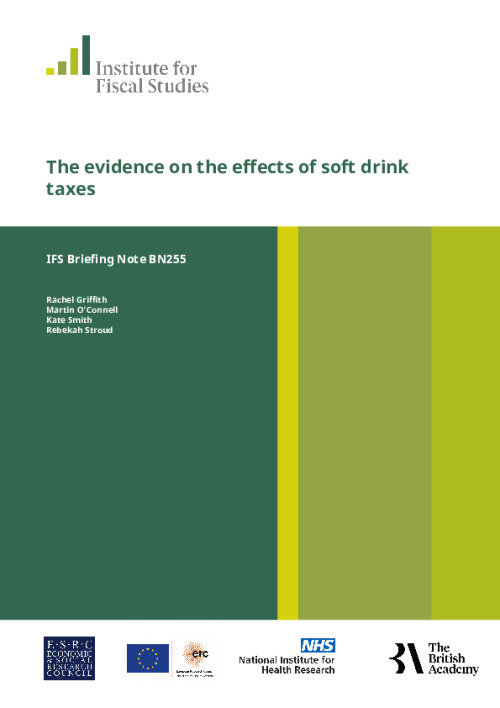In this briefing note, we review the evidence on the effects of soft drink taxes, with a focus on its relevance to the UK context. As of August 2019, 50 jurisdictions levied taxes on soft drinks, many of which have been implemented in the past couple of years. We review all (to the best of our knowledge) published [1] studies that have carried out an ex-post analysis of the effects of soft drink taxes on prices or purchases [2] and are published in English (27 studies on 11 jurisdictions).
The majority of taxes on soft drinks apply to drinks containing added sugar. Such taxes aim to reduce sugar consumption by increasing the price of sugary drinks, which is likely to lead to a reduction in purchases and a commensurate reduction in consumption. A tax may also lead to reductions in sugar consumption through other channels; for example, due to product reformulation to lower sugar content, or by conveying information about the health costs of sugar consumption. The strength of these effects depends on how the tax is structured, as well as how people and firms respond to the tax.
Key findings
- All studies that look at the effects on prices find that soft drink taxes lead to increased prices. The size of the increase varies, reflecting differences in the size and structure of the tax, the set of products and the size of jurisdiction to which it applies. Pass-through is lower in smaller jurisdictions, where the ease of avoiding the tax leads to competitive pressures to keep prices down. In settings that are most similar to the UK, the estimates suggest that the tax is fully passed through to prices.
- Most studies find that soft drink taxes have resulted in reductions in purchases of taxed drinks. The largest effects on purchases have been found in Philadelphia; here, the tax rate is high (almost double the average UK rate), it applies to soft drinks containing sugar and artificial sweeteners, and it is fully passed through to prices. In Mexico, which has been the focus of multiple studies, the tax on soft drinks containing added sugar led to reductions in purchases of taxed beverages. Studies on the effects of taxes in Catalonia, Chile, France and the state of Washington all found statistically significant reductions in the purchases of products subject to the tax. Differences in the estimated size of these effects reflect differences in the tax rates, the set of products taxed, the size of jurisdiction to which the tax applies, and the methodology of the study.
[1] We include all studies that we could find that were published in academic journals or working paper series. There is an unpublished study that looks at the impact of reforms to excise taxes on alcohol and soft drinks in Denmark (Bergman and Hansen, 2017) and another very recent unpublished study that looks at the rapid rise and then decline in the excise tax rate on soda in Denmark from 2012 to 2014 (Schmacker and Smed, 2019), which we do not include. There is at least one study that looks at the effect of broader-based taxes, the tax implemented in Finland that was applied to high-sugar foods and drinks, which we do not include (Kosonen and Savolainen, 2019).
[2] We also include two studies that consider only the impact on consumption, rather than purchases.













